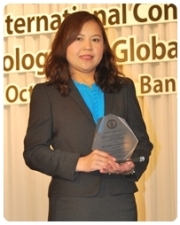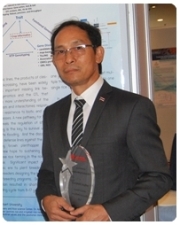Ms. Wansika Kiatpathomchai, BIOTEC researcher, based at Center of Excellence for Shrimp Molecular Biology and Biotechnology, was awarded Taguchi Prize for Outstanding Research Achievement in Biotechnology 2013 and Assoc. Prof. Apichart Vanavichit, Director of Rice Gene Discovery Unit, was the recipient to the Ajinomoto Lecture Award 2013. Both awards were announced at the 25th Annual Meeting of the Thai Society for Biotechnology and International Conference 2013 (TSB 2013) on 17 October 2013.

Ms. Wansika was recognized for her success in developing DNA diagnostic techniques using loop-mediated isothermalamplification (LAMP) to detect pathogens of aquatic animals and humans. The developed LAMP platform operates under isothermal conditions by self-recurring strand-displacement DNA synthesis using specially designed primer sets. Although LAMP assays have been widely used in animal and human disease diagnosis, detection of positive LAMP reaction was conventionally visualized by agarose gel electrophoresis of amplicons stained with carcinogenic ethidium bromide. This hazardous and time consuming detection step can be replaced by cheaper, equally sensitive, more rapid and simpler methods including the uses of a turbidimeter, lateral flow dipsticks (LFD) or oligonucleotide-labled nanogold probes and also metal indicators. These methods have been successfully applied for detection of shrimp pathogens (e.g. white spot syndrome virus, yellow head virus and Taura syndrome virus), for the detection of fish (tilapia) pathogens (Streptococcus iniae and S. agalactiae) and for human pathogens [e.g., LAMP combined with LFD or nanogold particle probes for detection of tuberculosis (Mycobacterium tuberculosis), malaria (Plasmodium facipalum, Plasmodium vivax) and methicillin-resistant Staphylococcus aureus (MRSA)]. These integrated LAMP techniques are sensitive, simple, rapid and cost-effective and can be manufactured locally, reducing the need for imported diagnostic kits. They can be applied in routine diagnosis and are also more suitable for field conditions making them more suitable for use in quarantine/surveillance programs.

In the award presentation ceremony, Assoc. Prof. Apichart, who was honored with Ajinomoto Lecture Award 2013, gave a lecture on “Next generation plant breeding and the future of Thai rice". His expertise and dedication to rice breeding using modern technology are well accepted by a wide range of leading scientists in rice biotechnology research both locally and internationally.
